Can chickens eat strawberries? Yes, chickens can indeed eat strawberries. The sweet, juicy fruit is a good source of vitamins, minerals, and antioxidants. Not to mention, chickens love them!
Strawberries are packed with vitamin C, which helps keep chickens healthy and strong. They are also a good source of fiber, which aids in digestion. Strawberries also contain magnesium, iron, and manganese.
Chickens should be given strawberries in moderation – a few at a time or as treats now and then. This article will discuss the health benefits of strawberries for chickens and how to feed them safely.
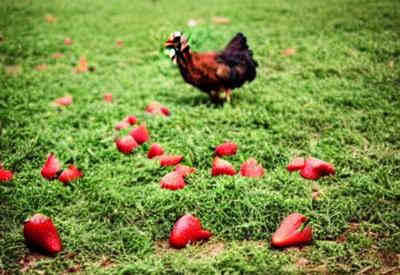
Can chickens eat strawberries?
The answer is yes; chickens can eat strawberries. However, they should only be fed in moderation as a treat and not as a significant part of their diet.
Strawberries are nutritious for chickens, providing them with healthy antioxidants and essential vitamins like vitamin C. They can also help boost the flavor of the chickens’ eggs.
However, because of their high sugar content and acidic nature, you should feed strawberries in moderation. Chickens have a harder time digesting and metabolizing sugar, so too many strawberries can cause digestive upset or even lead to obesity.
[ChickenAffiliate]
The benefits of eating strawberries for chickens
To have the healthiest chickens, you must ensure they receive the proper nutrition. One way to do this is by supplementing their diet with strawberries. Here are five benefits of giving your chickens strawberries.
Vitamins and Minerals
Strawberries contain essential vitamins and minerals such as vitamin C, calcium, magnesium, iron, and potassium. All these nutrients are vital for maintaining the health of your chickens since they help support the immune system, bone strength and growth, and egg production.
The antioxidants in strawberries also help protect against free radical damage, which can be beneficial for reducing inflammation in chickens.
Fiber
Strawberries contain high amounts of dietary fiber, which helps keep your chickens’ digestive tract healthy by promoting regular bowel movements. Fiber also helps slow down digestion which helps your birds feel fuller longer, so they don’t overeat.
This is especially helpful for overweight or obese chickens, as it can help them maintain a healthier weight.
Reduce Stress
Strawberries contain tryptophan, an amino acid that helps reduce stress levels in animals, including chickens. When stressed out, chickens produce fewer eggs, so keeping them calm and relaxed is important to keep their egg production up.
Strawberries can be a great way to help reduce stress naturally without having to resort to artificial means like medications or supplements.
Improve Egg Quality
Strawberries contain antioxidants that can improve the quality of eggs produced by your chickens. Antioxidants help protect against free radical damage, which can lead to lower-quality eggs with fewer nutrients than normal eggs would have otherwise contained.
By adding strawberries into your chicken’s diet, you can ensure they produce eggs with higher levels of vitamins and minerals than usual, leading to better overall health for you and your birds!
Boost Immune System
Eating strawberries regularly can help boost your chickens’ immune system thanks to their high antioxidant content. Antioxidants help fight off free radicals that cause oxidative damage in cells, leading to reduced inflammation throughout the body and improved immunity against diseases such as colds or other illnesses common among poultry flocks.
This makes it easier for them to stay healthy even when exposed to potential pathogens in their environment or through contact with other birds.
Things to watch out for when feeding strawberries to chickens
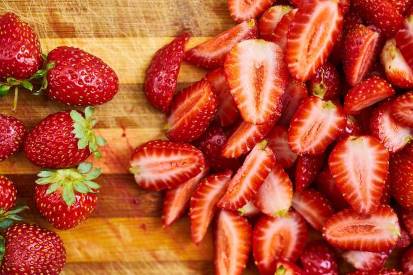
There are a few points you should keep in mind when feeding strawberries to your chickens. Here’s what you need to know.
Strawberry Variety Matters
Not all varieties of strawberries are suitable for chickens. While wild strawberries may be plentiful in certain areas, they have high levels of oxalic acid, which can be toxic for chickens if eaten in large enough amounts.
On the other hand, domestic varieties typically have lower levels of oxalic acid and are safer for chickens to consume.
Limit Their Intake
Just because something is safe doesn’t mean it should be consumed liberally. Too much sugar from any food source can lead to weight gain, digestive issues, and even diabetes in some cases.
Moderation is key – try limiting yourself to 1 – 2 strawberry treats per chicken per week and balance out their diet with plenty of leafy greens and grains like oats, wheat, and corn.
Watch Out For Pesticides
When shopping for strawberries for your flock, make sure you opt for organic varieties whenever possible, as this will help ensure that no harmful pesticides end up in your chicken’s food bowl.
If you grow your own strawberries, try using natural methods such as companion planting, hand weeding, and mulching to deter pests instead of relying on chemical pesticides or fertilizers, which could harm your birds if ingested.
How often should chickens eat strawberries?
Proper nutrition is critical when raising chickens, and one of the biggest questions about their health is how often they should eat strawberries. Since the chicken diet should consist of complex carbohydrates and protein, enjoying strawberries as a treat is perfectly fine.
As with most treats, however, you should feed your flock at most 10% of their daily food intake – in this case, that would be one strawberry per bird each day.
How to prepare strawberries for feeding to chickens
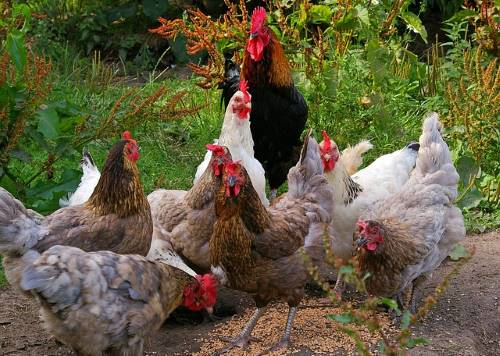
If you want to keep your chickens healthy and happy, you must take the time to properly prepare the strawberries before feeding them to your birds. Here’s what you need to know about preparing strawberries for your chickens properly.
Clean the Strawberries
The first step in preparing strawberries for your chickens is ensuring they are clean and free from dirt, bacteria, and other contaminants. Start by rinsing off the strawberry under cool running water.
If necessary, use a soft brush or cloth to gently scrub off any dirt or debris that may be stuck on the strawberry. This will help ensure that you don’t accidentally feed your chickens any harmful bacteria or pesticides.
Cut the Strawberries into Bite-Size Pieces
Once you have cleaned the strawberry, it’s time to cut it into bite-size pieces so that your chickens can more easily eat them. Slice each strawberry into small pieces, making sure that none of them are too large, as this can cause choking hazards for your birds.
You should also make sure that all of the pieces are roughly the same size so that your chickens can enjoy some of the treats without any bird getting too much or too little of it at once.
Store the Strawberries Properly
Once you’ve cut up your strawberries, you must store them properly. Keep them in an air-tight container and store them in a cool, dark place. This will help preserve their freshness and prevent any bacteria from forming on them before your chickens can enjoy their treats.
By taking the time to properly prepare, store, and feed strawberries to your chickens, you can make sure that your birds stay happy and healthy for years to come.
Can baby chickens eat strawberries?
The good news is that baby chickens can safely eat strawberries. Baby chicks need plenty of protein for healthy growth, but they also enjoy a bit of variety in their diet. However, it is important to remember that only feed your baby chicken small amounts of fruit as treats, as too much sugar can pose health issues.
Additionally, ensure the strawberries are fresh and washed before you allow your chickens to consume them, as unhygienic fruits can have lasting effects on their digestion.
What other berries can chickens eat?
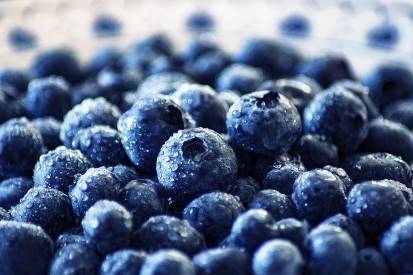
Berries are a great source of vitamins and minerals, as well as natural sugar, which helps chickens stay healthy and happy. In addition to strawberries, there are many other berries that chickens can enjoy. Let’s take a look at five more delicious options.
Blueberries
Blueberries are an excellent source of vitamin C and antioxidants, which help boost the immune system and protect against disease. They also contain fiber, which aids in digestion and helps keep your chickens’ intestinal tract healthy.
Blueberries contain natural sugars that give your chickens energy, so you should not overfeed them as this could lead to health issues.
Read More: Can Chickens Eat Blueberries? 5 Important Benefits
Blackberries
Blackberries are rich in antioxidant compounds like anthocyanins and flavonoids, which help protect against free-radical damage and oxidative stress.
They are also a good source of vitamin C and fiber, both of which aid in digestion. Blackberries have a slightly tart flavor that chickens love!
Read More: Can Chickens Eat Blackberries? 5 Fantastic Benefits
Cranberries
Cranberries are very high in vitamin C and contain antioxidants like flavonoids and quercetin, which help protect against disease and promote a healthy heart.
Cranberries also contain soluble fibers that help regulate cholesterol levels in the bloodstream and help maintain your chickens’ digestive health.
Read More: Can Chickens Eat Cranberries? 6 Amazing Benefits
Raspberries
Raspberries are loaded with vitamins A and C, folate, magnesium, iron, potassium, manganese, phosphorus, and zinc – all essential for chicken health. Raspberries also contain ellagic acid, an antioxidant compound that has been shown to reduce inflammation in the body.
Raspberries can help reduce joint pain or stiffness in older birds or those with arthritis-like symptoms.
Read More: Can Chickens Eat Raspberries? 5 Awesome Benefits
Mulberries
Mulberries are one of the most nutrient-dense fruits available for your chickens. They contain high amounts of vitamin A (beta carotene) as well as other vitamins such as B1 (thiamine), B2 (riboflavin), B6 (pyridoxine), B9 (folic acid), E (tocopherols), and K1 (phylloquinone).
Additionally, they are packed with minerals like calcium, magnesium, iron, zinc, potassium, phosphorus, and sodium, making them an excellent choice for supplementing your flock’s diet with nutritional benefits.
Read More: Can Chickens Eat Mulberries? 6 Excellent Benefits
How to give chickens a healthy and balanced diet
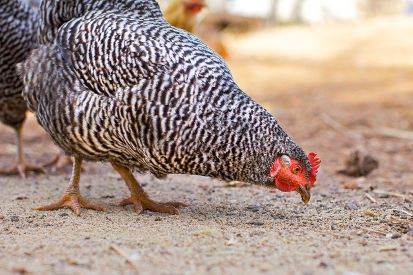
Ensuring your chickens receive a healthy, balanced diet is essential to their health and well-being. A healthy chicken diet should include a variety of protein sources, carbohydrates, vitamins, minerals, and other nutrients. This section will discuss the basics of feeding your chickens a well-balanced diet.
Protein Sources for Chickens
Protein is essential for your chickens’ growth and development. When choosing protein sources for your chickens’ diets, look for high-quality proteins like meat scraps, fish meal, eggs, insects, mealworms, and grubs.
Additionally, you can provide your chickens with grains such as oats or wheat to supplement their diets. Avoid giving them too many processed foods, as these are usually low in nutrients and can be difficult to digest.
Carbohydrates
In addition to proteins and fats, carbohydrates are essential components of any healthy chicken diet. Some good sources of carbohydrates include grains like barley or corn; vegetables such as spinach or squash; fruits like apples or oranges; and legumes like peas or beans.
Providing your chickens with plenty of fresh fruits and vegetables will give them access to plenty of vitamins and minerals as well as energy-rich carbohydrates that help fuel their metabolism.
Vitamins and Minerals
Vitamins and minerals are essential for good health in all animals – including chickens. Ensure you provide your flock with plenty of fresh greens throughout the year to get enough vitamins A, B1, B2, B3, C, E, and K.
Additionally, providing them with calcium supplements such as oyster shells can help strengthen their bones while growing up.
Can chickens eat strawberries – final thoughts
Chickens can safely enjoy strawberries as a treat, but it is important to remember that they should not make up more than 10% of their daily diet.
Additionally, make sure that you take the time to properly prepare and store the strawberries before feeding them to your chickens. You can also offer your birds other types of berries as treats, such as blueberries, raspberries, and blackberries.
By following these guidelines, you can ensure that your chickens stay healthy and happy for years to come.
Related Articles:
